#berkeley's on fire
Photo

Berkeley, MO
#larryshapiro#Larry Shapiro#Shapirophotography.net#Larryshapiro.tumblr.com#larryshapiroblog.com#FireTruck#Spartan#Gladiator#Evolution#Smeal#BerkeleyFD#Berkeley MO#Berkeley Fire Department
2 notes
·
View notes
Text
Landscape in San Francisco

An example of a large contemporary drought-tolerant and full sun backyard stone landscaping with a fire pit in spring.
0 notes
Photo

Natural Stone Pavers Landscape San Francisco
Here is an illustration of a sizable, modern, drought-tolerant, full-sun backyard with stone landscaping and a fire pit in the spring.
0 notes
Text
Mario Savio giving a speech at Berkeley in 1964 during an occupation of the university.
I mistakenly labeled this as an occupation and speech against the Vietnam war. It was in fact an occupation by the Free Speech Movement, who objected to attacks on free speech and academic freedom during the cold war, when "radical" student groups were banned and faculty had to swear an anti-Communist loyalty oath or be fired. Students objected to universities being used as a source of knowledge and innovation for the military industrial complex but not being allowed to speak their minds that, which does have a lot of parallels with the current occupations.
There's a time when the operation of the machine becomes so odious, makes you so sick at heart that you can't take part!
You can't even passively take part!
And you've got to put your bodies upon the gears and upon the wheels, upon the levers, upon all the apparatus -- and you've got to make it stop!
And you've got to indicate to the people who run it, to the people who own it -- that unless you're free the machine will be prevented from working at all!!
#1964#mario savio#speech#berkeley#students#student protest#anti-war#free palestine#palestine#university#occupation#Berkeley Free Speech Movement
2K notes
·
View notes
Video
Fire in the Brain by Davivid Rose
Via Flickr:
(I spun on the heel of one of my shoes on a shiny black marble floor tile that was covered with a film of drying soap, and then, using my cell phone, made this photo of the bare lightbulb in the ceiling reflected there.) (Altered with software.) A randomly-edited selection of approximately 700 of my pictures may be viewed by clicking on the link below: www.flickr.com/groups/psychedelicart/pool/43237970@N00/ Please click here to read my "autobiography": thewordsofjdyf333.blogspot.com/ And my Flicker "profile" page may be viewed by clicking on this link: www.flickr.com/people/jdyf333/ My telephone number is: 510-260-9695
0 notes
Text
youtube
#2206#june 2022#snakehead#warehouse show#berkeley#live music#video#archive#diydevotee#bay area#east bay#local band#music#archivist#fire breathing
1 note
·
View note
Text
A nightingale sang in the London Blitz
When exactly was that certain night, the night Aziraphale and Crowley met — and spoke for the first time in 79 years in the midst of the London Blitz?
And what’s the deal with the nightingale’s song, really?
Grab something to drink and we’ll look for some Clues below.
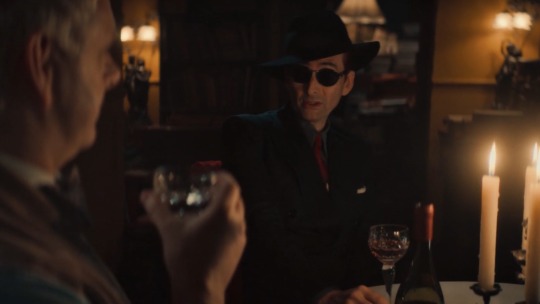
The night they met
The Blitz, short for Blitzkrieg (literally: flash war) was a German aerial bombing campaign on British cities in the WW2, spanning between 7 September 1940 and 10 May 1941. The Luftwaffe attacks were carried out almost non stop, with great intensity meant to force a capitulation and similarly strong impact on British life and culture at the time.
Starting on 7 September 1940, London as the capital city was bombed for nearly 60 consecutive nights. More than one million London houses were destroyed or damaged, and more than 20,000 civilians were killed, half of the total victims of this campaign.
The night of 29 December 1940 saw the most ferocity, becoming what is now known as the Second Great Fire of London. The opening shot of the S2 1941 minisode is a direct reference to recordings of that event, with the miraculously saved St Paul’s Cathedral in the upper left corner.
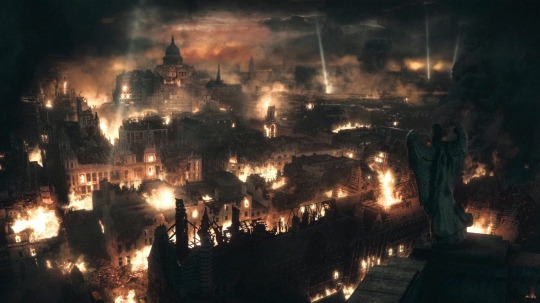
The actual raid lasted between 06:15 and 09:45 PM, but its aftermath continued for days. The old and dense architecture of this particular part of the city turned into a flaming inferno larger than the Great Fire of 1666. Multiple buildings, including churches, were destroyed in just one night by over 100,000 bombs.
Incendiary bombs fell also on St Dunstan-in-the-East church that night, the real-life location of this scene as intended by Neil. It was gutted and again claimed by fire in one of the last air rides on 10 May, when the bomb destroyed the nave and roof and blew out the stained glass windows. The ruins survived to this day as a memorial park to the Blitz.
Such a delightfully Crowley thing to do: saving a bag of books with a demonic miracle adding to the biggest catastrophe for the publishing and book trade in years. 5 million volumes were lost, multiple bookshops and publishing houses destroyed in the December 29th raid alone.
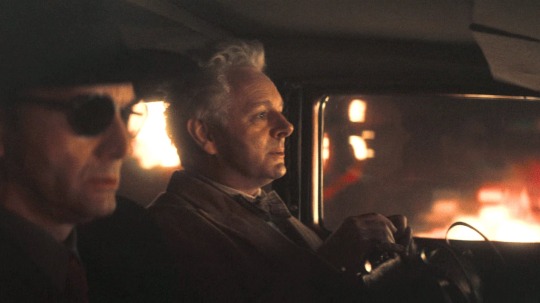
Even without this context, judging by the seemingly unending night, overwhelming cold and darkness, broken heating at the theatre, and seasonal clothing (like Aziraphale and Crowley’s extremely nice winter coats), it’s rather clear that it was the very beginning of the year 1941.
Everything suggests that Aziraphale and Crowley’s Blitz reunion happened exactly 1900 years after their meeting in Rome — which, according to the script book, took place between 1 and 24 January 41 (Crowley was right: emperor Caligula was a mad tyrant and didn't need any additional tempting; there's a reason why he was murdered by his closest advisors, including members of his Praetorian Guard, on 24 January 41).
Interestingly, both events involved a role reversal in their otherwise stable dynamic, with Aziraphale spontaneously taking the lead instead of letting the demon be the one to do all the tempting and saving, and ended with a toast.
The S2 Easter Egg with the nuns of the Chattering Order of St Beryl playing table tennis at the theatre suggests that the Blitz meeting happened on a Tuesday afternoon, which doesn’t match any of the above mentioned days, but sets the in-universe date for 7 January 1941 or later.
The Chattering Order of Saint Beryl is under a vow to emulate Saint Beryl at all times, except on Tuesday afternoons, for half an hour, when the nuns are permitted to shut up, and, if they wish, to play table tennis.
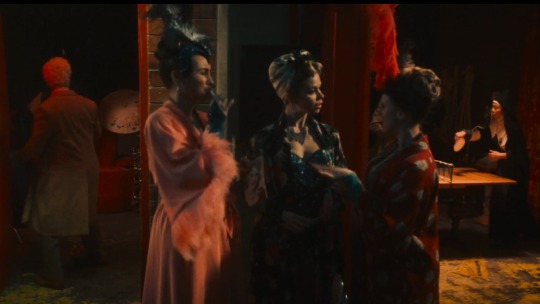
The nightingale
January means one thing: absolutely no migratory birds in Europe yet. They’re blissfully wintering in the warm sun of Northern Africa at the time. But, ironically, when the real nightingales flew off, a certain song about them suddenly gained popularity in the West End of London.
It might be a shock, but A Nightingale Sang in Berkeley Square wasn’t a hit from the start — even though its creators, Eric Maschwitz and Manning Sherwin, were certainly established in their work at this point. The song was written in the then-small French fishing village of Le Lavandou shortly before the outbreak of the Second World War with first performance in the summer of 1939 in a local bar, where the melody was played on piano by the composer Manning Sherwin with the help of the resident saxophonist. Maschwitz sang his lyrics while holding a glass of wine, but nobody seemed impressed. It took time and a small miracle to change that.
Next year, the 23-year-old actress Judy Campbell had planned to perform a monologue of Dorothy Parker’s in the upcoming Eric Maschwitz revue „New Faces”. But somehow the script had been mislaid and, much to her horror, replaced with the song A Nightingale Sang in Berkeley Square. She had never professed to be a singer but even so, she gathered her courage and went out onto the moonlit set dressed in a white ball gown. Her heartfelt rendition of the now evocative ballad captured the audience’s imagination and catapulted her West End career to stardom.
It was precisely 11 April 1940 at the Comedy Theatre in Panton Street and the revue itself proved to be a great success — not only it kept playing two performances nightly through the Blitz, but also returned the next year. And the still operating Comedy Theatre is mere five minutes on foot from the Windmill Theatre, where Aziraphale performed in 1941, and not much longer from his bookshop.
Now, most Good Omens meta analyses focus on Vera Lynn’s version of the song from 5 June 1940, but it didn’t get much attention until autumn, specifically 15 November, when Glenn Miller and his orchestra published another recording. And Glenn Miller himself is a huge point of reference in Good Omens 2.
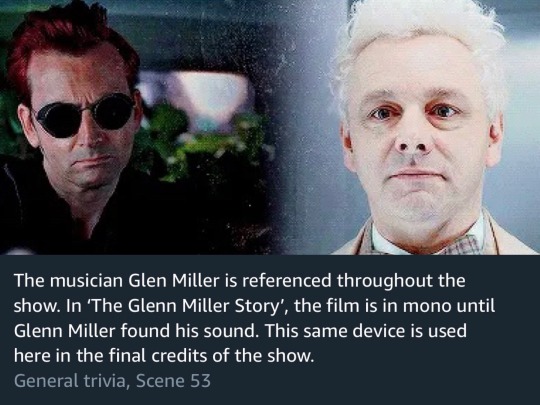
According to the official commentary the infamous credits scene is establishing Aziraphale and Crowley’s final resolve for the next season using the same narrative device The Glenn Miller Story (1954) does in its most crucial scene. It starts with the tune (and audio in general) totally flat, then adds a piano on one side, and gradually becomes fully multidimensional. The Good Omens credits not only emulate the same sound effect, but bring it to the visual side of the narrative by literally combining the individual perspectives of the two characters together. Even though they’re physically apart, their resolve — and love to each other — brings them even closer than before. Aziraphale smiles not because he’s being brainwashed, but because he knows exactly what to do next.
Some of you might have noticed that Tori Amos’s performance for Good Omens is actually a slightly shortened version of Miller’s recording — much less sorrowful than Vera Lynn’s full lyrics that include i.a. this bridge:
The dawn came stealing up
All gold and blue
To interrupt our rendez-vous
I still remember how you smiled and said
Was that a dream or was it true?
Which is a huge hint when it comes to what we can expect from the main romantic plot line in the Good Omens series. The original song introduces an element of the doubt — it seems like there was no nightingale at all, only the mirage woven by the singer clearly intoxicated with love, much like Aziraphale and Crowley for the length of the last six episodes. Crowley’s comment in the season finale might allude to that interpretation, stating that there are no nightingales — never have been. It was all a dream. But the version we’re working with here is short and sweet, and devoid of that doubt. In the Good Omens universe angels were actually dining at the Ritz, the streets were truly paved with stars (or will be shown as such in the next season), and a nightingale really sang in Berkeley Square, as the omniscient, omnipresent, and omnipotent narrator, God Herself, had shown us.
All in all, it’s not an accident that the “modern” swing ballad activating Aziraphale’s memory and opening the 1941 minisode is the Moonlight Serenade by Glenn Miller. It’s a track naturally associated with A Nightingale Sang in Berkeley Square when it comes to music style and the sentiment in the lyrics.
But why the sudden popularity? In the great uncertainty and hardship of the Blitz, A Nightingale Sang in Berkeley Square provided solace and escapism for listeners, offering a glimpse of hope and love amidst the darkness of war. It became a universal anthem of resilience and a reminder of the power of love transcending difficulties. By January 1941 the whole city knew this tune by heart, including a certain West End aficionado with a cabinet full of theatre programs in his bookshop. Thanks to Maggie’s grandmother, he most probably had a record at hand to play during his spontaneous wine night with Crowley. We can only suspect the details, but it was was mutually established as their song exactly at that time or soon afterwards. Pretty sure we will see a third installment of that minisode for many, many reasons, but especially because of this “several days in 1941” answer by Neil:
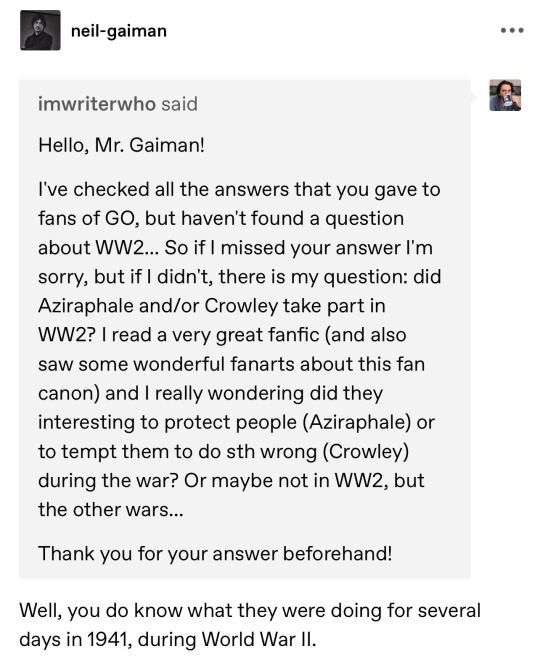
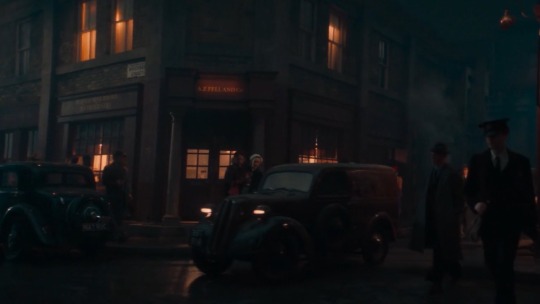
The Man Hunt
In 1941 A Nightingale Sang in Berkeley Square gained even more popularity as the romantic theme of the Fritz Lang’s newest film Man Hunt. The 1939 story by Geoffrey Household first appeared under the title “Rogue Male” as a serial in the Atlantic Monthly Magazine where it received widespread comment, soon becoming a world-wide phenomenon in novel form. Its premise criticizes Britain's pre-war policy of appeasement with Germany, ready to sacrifice its own innocent citizens to the tentative status quo. Sounds a bit like Heaven's politics, right?
Yes, I'm trying to make you watch old movies again — like all the other classics, Man Hunt (1941) is easily available on YouTube and other streaming websites.
The next part will include spoilers, so scroll down to the next picture if you prefer to avoid them.
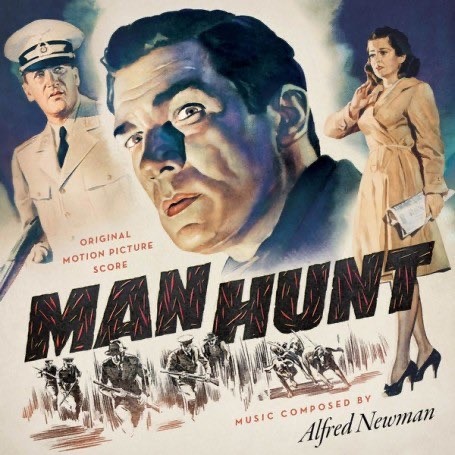
The plot of the movie seems simple enough: the tall, dark, and handsome Alan Thorndike, who nearly assassinates Hitler, narrowly escapes Germany and back in London continues to evade the Nazi agents sent after him with the help of a young trench-clad “seamstress” named Jerry, bridging the class divide and becoming unlikely friends-partners-romantic interests. It doesn’t end well though.
Jerry's small London apartment serves as a hideout for Alan when he was being followed by Nazis, similarly to how Aziraphale's bookshop is a safe haven for both Crowley and Gabriel in S2. She helps the man navigate the streets and eventually out of London — by sacrificing herself and getting forcefully separated from him by a patrolling policeman. The last time they see each other, Alan watches Jerry look back at him yearningly and disappear in the fog, followed by the elderly officer.
Unfortunately in the next scene we learn that the latter is a Nazi collaborator and helps the agents apprehend Jerry in her own flat. Staying loyal to her love and uncooperative, she’s ultimately thrown out of a window to her death, but posthumously saves Alan once again — through the arrow-shaped hatpin he gifted her earlier that is presented to him as the evidence of her off-screen fate.
Long story short, thanks to Jerry’s sacrifice Alan not only survives, but is able to join the war that broke out in the meantime and go back to Germany, armed with a rifle and a final resolve to end what he started, no matter how long will it take. The justice will be served and the dictator will pay with his life for his sins.
I wouldn’t be myself without mentioning that the main villain has a Roman chariot statue similar to the one in Aziraphale’s bookshop, an antique sculpture of St Sebastian (well-known as the gayest Catholic Saint) foreshadowing his demise, and a chess set symbolizing the titular manhunt/game of tag with the protagonist.
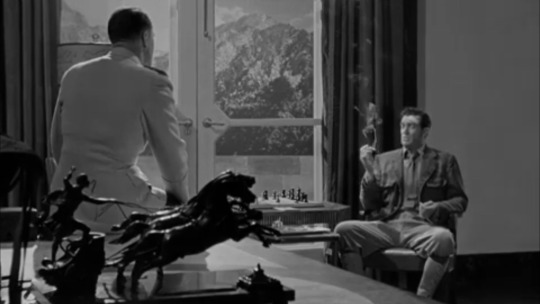
Aziraphale’s song
Will Aziraphale sacrifice himself as well? Or has he already? If his coin magic trick can be any indicator, we should expect at least a shadow of a danger touching the angel’s wings soon.
Let’s sum up the 1941 events from Aziraphale’s perspective: the very first time they’ve interacted after almost a century, Crowley actively sabotaged his entire existence twice by stepping onto a holy ground and by being outed by agents of Hell, both on the very same night and both because of his undying dedication to the angel. That’s enough of a reason not only for performing an apology dance, but also maintaining a careful distance for Crowley’s sake for the next 26 years. Only when he heard that his idiot was planning to rob a church, he gave up since he “can't have him risking his life”.
That’s when Crowley, sitting in a car parked right under his bookshop, offered him a ride. It wasn’t even subtle anymore. It was supposed to be a date, this time both of them understood it. But Aziraphale wouldn’t risk Crowley’s safety for his own happiness, especially not when he can name his feelings towards him and knows that they are reciprocated — the biggest lesson he learnt back in 1941.
So he did what he’s best at, he cut Crowley off again, but this time with a promise of catching up to his speed at some point. Buddy Holly’s Everyday, which was originally planned to play afterwards instead of the Good Omens theme, adds additional context here:
No, thank you. Oh, don’t look so disappointed. Perhaps one day we could... I don't know… Go for a picnic. Dine at the Ritz.
Aziraphale, carefully looking around and feeling observed through the whole conversation in the Bentley, consciously used the “Dine at the Ritz” line from A Nightingale Sang in Berkeley Square, from their song, as a code only the two of them understand. Not as a suggestion to go out for a meal, but a promise. A hope for the privilege of being openly in love and together — maybe someday, not now, when it’s too dangerous — even if it leads to a bad ending.
Fast forward to 2023 when for one dreadful moment Crowley’s “No nightingales” robbed Aziraphale even of that semblance of hope. He looked away, unable to stop his tears anymore. Only their kiss helped him pull himself together and make sure that a nightingale did sing the last time he turned — just like in their song — this time without a smile, as a goodbye.
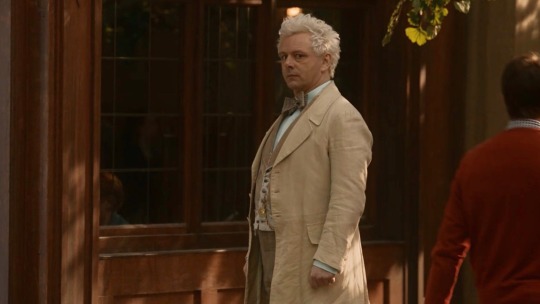
#a nightingale sang in the london blitz#the song is a code#and is miracled as a sign#aziraphale needs a hug#no nightingales#history rant#yuri is doing her thing#the good omens crew is unhinged#neil gaiman#st dunstan-in-the-east#1941 minisode#1941 flashback#a nightingale sang in berkeley square#good omens#good omens meta#good omens 2#go2 meta#go2#ineffable husbands#aziraphale#crowley#1941 aziraphale#1941 crowley#the blitz#man hunt (1941)#the glenn miller’s story (1954)#why am i like this#why do i do this to myself#long post
314 notes
·
View notes
Text
FITF Tour exit songs
- NA LEG - Uncasville: Tina Turner - The Best
Gilford: The Smiths - This Charming Man
Laval: Petula Clark - Downtown
Toronto: Bryan Adams - Summer Of '69
Cuyahoga Falls: The Verve - Bitter Sweet Symphony
Sterling Heights: Shed Seven - Chasing Rainbows
Cincinnati: The Killers - All These Things That I've Done
Columbus: R.E.M. - The One I Love
Indianapolis: Joy Division - Love Will Tear Us Apart
Maryland Heights (St. Louis): Chuck Berry - Johnny B. Goode
Kansas City: Van Morrison - Moondance
Milwaukee: Johnny Nash - I Can See Clearly Now
Chicago: Earth, Wind & Fire - September
Minneapolis: Sinéad O'Connor - Nothing Compares 2 U
Council Bluffs: Buzzcocks - Ever Fallen In Love (With Someone You Shouldn't've)
Sioux Falls: Don McLean - American Pie
Seattle: The Smiths - There Is A Light That Never Goes Out
Vancouver: The Police - King Of Pain
Troutdale: Elvis Presley - Always On My Mind
Berkeley: INXS - Never Tear Us Apart
Los Angeles: 2Pac - California Love
Las Vegas: The Killers - Human
Phoenix: Spear Of Destiny - Liberator
Irving: The Doors - Hello, I Love You
Austin: Wheatus - Teenage Dirtbag
Houston The Woodlands: The Police - Walking On The Moon
St. Augustine: The Police - Every Breath You Take
Hollywood: Elton John - Your Song
Tampa: Pat Benatar - Hit Me With Your Best Shot
Atlanta: The Rolling Stones - You Can't Always Get What You Want
Nashville: Duran Duran - Hold Back The Rain
Charlotte: Lou Reed - Perfect Day
Raleigh: Van Morrison - Moondance
Columbia: Commodores - Easy
Boston 1: Boston - More Than A Feeling
Boston 2: Pixies - Here Comes Your Man
Philadelphia: Sinéad O'Connor - Nothing Compares 2 U
Asbury Park: Bruce Springsteen - Dancing In The Dark
New York: Queen - We Are The Champions (dj elf asked a fan to pick between this one and David Bowie - Heroes)
- EU & UK LEG - Hamburg: Joy Division - Love Will Tear Us Apart
Copenhagen: Queen & David Bowie - Under Pressure
Oslo: Green Day - Wake Me Up When September Ends
Stockholm: The White Stripes - Seven Nation Army
Helsinki: Elvis Presley - Always On My Mind
Tallinn: Smash Mouth - All Star
Riga: AC/DC - Thunderstruck
Kaunas: Elvis Presley - Can't Help Falling in Love
Krakow: Iggy Pop - Lust For Life
Łódź: Ramones - Blitzkrieg Bop
Vienna: Oasis - Supersonic
Ljubljana: The Killers - Smile Like You Mean It
Budapest: Bloc Party - Helicopter
Bucharest: Foo Fighters - My Hero
Sofia: Rage Against The Machine - Bombtrack
Bilbao: Pixies - Where Is My Mind
Lisbon: White Lies - Farewell to the Fairground
Madrid: Editors - Munich
Barcelona: At the Drive-In - One Armed Scissor
Turin: Lenny Kravitz - Are You Gonna Go My Way
Bologna: Bloc Party - Helicopter
Luxembourg: Pixies - Where Is My Mind
Antwerp: Queens Of The Stone Age - My God Is The Sun
Paris: Biffy Clyro - Bubbles
Amsterdam: Blur - Song 2
Cologne: The Libertines - Can't Stand Me Now
Prague: Jet - Are You Gonna Be My Girl
Berlin: The Cure - Friday I'm in Love
Munich: Fatboy Slim - Praise You
Zurich: The Strokes - Last Nite
Dublin: Inhaler - These Are The Days
Sheffield: The Killers - Mr. Brightside
Manchester: The Smiths - This Charming Man
Glasgow: The Snuts - Gloria
Brighton: Ramones - I Wanna Be Sedated
Cardiff: T. Rex - 20th Century Boy
London: The Libertines - Can't Stand Me Now
Birmingham: Boyz II Men - End Of The Road
- ASIA & AUS LEG - Jakarta: Iggy Pop - Lust For Life
Melbourne: Jet - Are You Gonna Be My Girl
Brisbane: The Temper Trap - Fader
Sydney: Oasis - Rock 'N' Roll Star
- LATAM LEG - Panama: Hard-Fi - Living for the Weekend
San Juan: Pixies - Where Is My Mind
Rio de Janeiro: Nirvana - Heart-Shaped Box
Like last time the plan is to keep editing this post as tour goes on - 2022 LTWT here
Apple music playlist here
#spotify#fitf tour#exit songs#exit song#louis playlist#playlist#i dont have a consistent tag bjt that should hit it
917 notes
·
View notes
Text
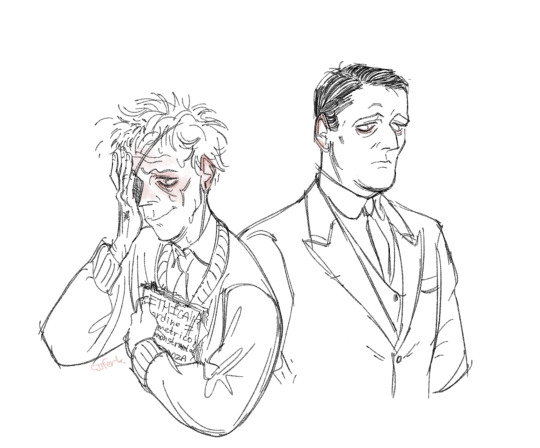
WW2 AU
PART 1
(+2scetches)
One September day, B. Wooster found out about Jeeves' disappearance from Aunt Dahlia's telegram.
Early summer of 1940. Bertram Wooster was completing his studies at an aviation school. At the same time his faithful valet, Jeeves, temporarily went to the service of the already mentioned relative at Brinkley Court and became the second jewel in the staff of servants besides the highly talented cook Anatole.
Due to the straitened financial situation of Uncle Tom, who complained more and more about the increasing taxes, the dearest aunt had to take forced measures and fire a few servants. She wanted to make a small sacrifice, and it might have been enough if one day her stingy husband had not cut the already small wages of the remaining servants. Many of them had applied for dismissal after that, and they were quite understandable.
This radical decision, although to a lesser extent, also affected Jeeves. Nevertheless, he continued to be a professional. He fulfilled his basic duties and often helped her, and her old friends get out of troubles.
Within a few months of Jeeves' work, they had become friends. Bertram almost felt like a third wheel in this idyll when he came to visit and boast of his achievements. Aunt Dahlia treasured her new valet and his unrivalled intelligence, and often jokingly promised in letters to her nephew that Jeeves would be returned safe and sound.
That was why she was seriously worried when Jeeves went missing. One clear day in early September, an elderly relative had let him go to London on his own business. In addition to this, it was Jeeves' duty to check on their good old Berkeley Mansions flat from time to time and keep it clean, so he planned to finish his business by evening and stay in the city overnight. He was supposed to return early the next morning. But that never happened. Not in two days. Not in three.
That night London was bombarded.
Something seemed to snap and collapse inside Bertie when he learnt that the search for Jeeves had been fruitless. Neither his relatives nor his club could shed any light on his mysterious disappearance.
The dark thoughts from which Bertram had fled during the day caught up with him at night. He would toss and turn on the hard bed, thinking of Jeeves's fate and replaying happy memories of their past, and in the daytime, tired and broken, he would give his duty to his country.
The whole situation seemed strange and unreal to him. The only thing that was found out for sure was that no one appeared in the apartment that miraculously survived the monstrous raids that day. It was dusty.
A couple of months had passed since the tragedy that divided Bertie's life into before and after. The war continued. He was learning to adjust to his new reality.
Sometimes he managed to carve out some free time and pop into London for a bit. The city where he had lived more than a third of his life was in ruins. The familiar places where he used to meet his friends and have a good time were empty.
Your humble servant avoided going into that very flat. There were too many vivid memories of that place, which painfully and mercilessly squeezed Bertram Wooster's poor skull. Indeed, the most precious person in his life had been living at his side all that time.
But still, as the sole and responsible owner of his property, he had to overpower himself. He had to go in and make sure that everything was all right. And one such day Bertie found himself there, in their former cozy home.
He walked in and looked around the living room: a layer of dust covering almost everything, furniture wrapped in covers, and only a few of his own things that he had left or forgotten here. The piano was covered with a cloth. Unbearably quiet and lifeless. There was nobody else to keep order here, nobody else's hand to create the home comfort. Sorrowful feelings pressed upon his chest.
He looked all over the flat. Almost all of it. There was only one room left to check.
After a moment's hesitation, Bertram pulled himself together and went into Jeeves's room. He had only glimpsed it from inside before. It was modest and not as spacious as his bedroom. Wooster sat down on the perfectly made bed, looking at what little was left of his dear friend, guide, and philosopher. His eyes rested on the various books dusting the shelves and cupboards.
He recognized one of them. It was the volume of Spinoza's writings he had given Jeeves for his birthday. No doubt Jeeves had read it all. As the rest of the books in the room. Bertie remembered his politely grateful smile and how he had clearly decided that this fellow deserved a whole library of those Spinozas.
He got out of bed. The code of the Woosters did not allow him to touch other people's things (even if those things belonged to a man who might never come back into his life), but something outweighed the young master's unwavering principles that day.
He didn't even notice how he left the flat with the book in his hands.
Of course, this sort of talisman invariably occupied a place in his suitcase. Though he had endeavored to handle the book with care, it had become tattered with the passage of time. Bertram often held it in his hands, flicked through the pages, ran his eyes over the neat pencil notes of its former owner. It calmed him a little in the most difficult moments of his pilot practice. He didn't understand anything about philosophy, but he treasured this book too damn much.
When they reunited, they were about a year away from the end of the war. The house with their previous flat was in a state of emergency damaged by the recent bombing raids, so Jeeves looked for a new flat for them while his employer was still undergoing treatment.
It happened some time later after their move-in. Jeeves was doing his household chores while the young master followed him around and chattered about anything that came into his head. It would have annoyed anyone, but not Jeeves.
You see, he had been abroad for a long time. However, he was not on holiday. Against his will, he was assigned important tasks and missions which he had to fulfil if he did not want to lose his freedom, his successful career, his reputation, his family, and friends. The special promise of making one particular person's life unbearable also left him no choice.
Every day, Jeeves felt like he was sitting on a powder keg: at any moment, a surprise inspection could come through the doors of his headquarters. A highly undesirable event for a man who kept fake documents, weapons, and encrypted data transmission devices in his flat. But all possible escape routes had been carefully worked out and memorized: Jeeves was always prudent. Otherwise, he had to have time to take a special pill before he found himself tied to a chair in a small interrogation room.
Keeping his charm and politeness, he was effective in getting the right information from the right people. His knowledge of psychology and accumulated experience of working with people helped him in this.
Jeeves' missions were rarely close to failure. His life depended on it.
The slightest mistake could have been fatal to him. Of course, he had learned much about the country during his training to pass for a typical Frenchman. His French had been practically flawless even before, which only made his life easier. But still somewhere in the back of his mind was the fear that he would be exposed for the smallest inaccuracy.
Jeeves lived under a false identity with a fake life story. He changed outwardly and inwardly. His gait, the way he spoke, his body language, his facial expressions. He had complete control over his body. Especially his gaze, which could tell a lot about his thoughts. It was exhausting.
After a long time of living in this way, he began to have trouble sleeping: he slept very little and sensitively or could not fall asleep at all.
He rarely had any dreams during the restless hours when he was able to fall asleep. Sometimes he had nightmares. But they were not about him. They were about Mr Wooster. Same scenario: church, flowers, closed coffin. Then it would slowly open from the inside. And Jeeves would wake up in a cold sweat.

On sleepless nights, he was also tormented by thoughts of his former employer. Where was he now? Was he all right? Was he even alive? How did he feel about his disappearance? Would he want to see him again...?
Jeeves felt his mind, which he relied on in the most critical situations, begin to fail.
Meeting his employer again and doing the household chores for him, he felt himself slowly getting his head in order. He was enjoying the much-anticipated company of Mr Wooster. It soothed him and made him feel at home.
Jeeves opened the closet to put the ironed clothes in it. The young master standing next to him had been lost in the chatter and missed the moment when he should have pulled him back. In the next moment Jeeves had pulled the ruined book out of the wardrobe the same way as he pulled out foreign clothes. By the title of the book, he thought at first that his master was interested in serious literature. But on closer look and leafing through the book, he realized that it was his own.
Bertie watched it silently with his eye wide open. He couldn't just get rid of it, but at the same time he was ashamed to return a book in such a terrible condition to its owner. He planned to buy the exact same one soon, but until then, this volume of essays would be safely hidden away. But here his innocent secret was revealed. Jeeves looked at him with a silent question in his eyes.
He tried to justify himself, but this particular Wooster was a bad liar. Especially when the pent-up feelings were starting to overwhelm him. Jeeves often let his employer fool him about little things, but they both knew very well that it was actually impossible to do this. A couple of precise laconic remarks and B. Wooster found himself disarmed. He took a breath of air and began to speak.
Jeeves listened patiently to his poor master with a mask of calmness pulled over his face and dared not interrupt.
He was sorry. He was deeply sorry for the pain he had caused Mr Wooster and his dear people by his forced departure. However, Jeeves spoke little and reluctantly about what he had been doing in recent years and did not tell anyone about the very reasons for his disappearance. This information could have caused a lot of trouble.
And Bertram realized it. His Jeeves could not just disappear for no reason, he was sure of it. But sometimes, in the deep sleepless night, a wild guess would cross his weary mind. What if Jeeves had run away, had simply abandoned him? Of course, Bertie had scolded himself for such thoughts in the mornings then. And today when Jeeves prepares breakfast for him, reminds him to take his medicine, and helps him to dress, that idea seems to him on the verge of sanity. But then he was quite capable of finding irrefutable evidence in all sorts of little things. At that time, he did not know what to think: the search for the injured had ended, Jeeves remained on the list of missing persons.
Bertram stood before him and could find no more words. But words were no longer needed. Jeeves looked at him with bright, penetrating eyes and the silence that settled in the room was filled with peace. Jeeves was truly touched. He felt a huge boulder fall from his soul.
It seemed now, as his employer lowered his head dejectedly and hid his wet eyes from him, they had the perfect moment to dot the «i».
It's been a long day.
Of course, this book stayed in their new flat and became a symbol of something important for them. Bertram, Jeeves' poor love, had indeed taken desperate measures then.
However, Jeeves pointed out that such measures would no longer be necessary.
For now, he would be there for him. He came back.
#jeeves and wooster#bertie wooster#reginald jeeves#jooster#it should have been just a couple paragraphs to explain the context of the first picture.....#but somehow it turned into five pages of text#AHAHAH((#if you thought it was snotty and sentimental#you're right#it's just that sometimes I need something like that👉👈#actually I'm not good at writing serious fiction and fanfic and stuff like that#especially in English#it was hard#so feel free to criticize if you find any mistakes or wrong words I used#I will correct it :)#oh and one more thing#If I remember correctly Bertie was renting the apartment not owning it🤔#but there was no turning back...😔🥀#fanart#my art#artists on tumblr
99 notes
·
View notes
Text
Villain Song Showdown Preliminary Round #28
Top two will make it into the bracket
Songs below the cut
Finale - Villain: The Leading Player (Throw yourself into a fire they said, it'll be fun and fulfill you they said)
youtube
It Feels So Good To Be Bad - Villain: Red and Carface
youtube
On the Road - Villain: Mrs. Toad and her toad henchmen
youtube
Yer Beautiful, Baby - Villain: Berkeley Beetle (I like how just hearing the name of the song, I can already imagine the exact voice saying it)
From a Place of Love - Villains: Tommy and Merry
youtube
Your Best Nightmare - Villain: Flowey the Flower
youtube
The Trial (Pantheon edition) - Villain: Athena
youtube
King of Villains - Villain: Aurelio Voltaire
youtube
Cool, Considerate Man - Villain: John Dickinson/Congressional Conservatives from 1776
youtube
We Don't Talk About Bruno - Villain: Bruno Madrigal (assumedly)
youtube
#villain song showdown#preliminary round#pippin#pippin musical#all dogs go to heaven#all dogs go to heaven 2#thumbelina#library of ruina#undertale#stray gods#black labyrinth#aurelio voltaire#1776 musical#encanto#tournament poll#Youtube
102 notes
·
View notes
Text
Hollywood is the single best example of mature labor power in America
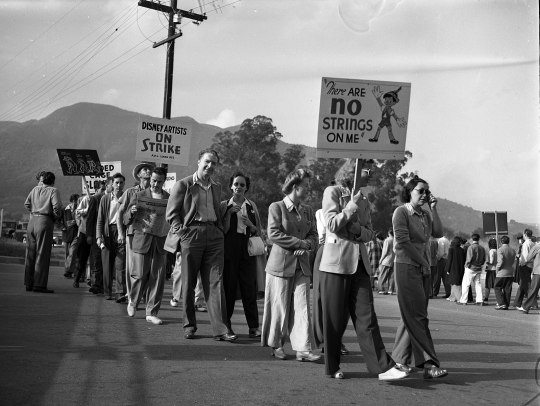
This afternoon (May 6), I’ll be in Berkeley at the Bay Area Bookfest for a 3:30PM event with Glynn Washington for my book Red Team Blues; tomorrow (May 7), it’s an 11AM event with Wendy Liu for my book Chokepoint Capitalism.
Weds (May 10), I’m in Vancouver for a keynote at the Open Source Summit and a book event at Heritage Hall and Thu (May 11), I’m in Calgary for Wordfest.

The Writers Guild is on strike. Hollywood is closed for business. The union’s bargaining documents reveal a cartel of studios that refused to negotiate on a single position. This could go on for a long-ass time:
https://www.wga.org/uploadedfiles/members/member_info/contract-2023/WGA_proposals.pdf
If you’d like an essay-formatted version of this post to read or share, here’s a link to it on pluralistic.net, my surveillance-free, ad-free, tracker-free blog:
https://pluralistic.net/2023/05/06/people-are-not-disposable/#union-strong
The writers are up for it. A lot of people are saying this is the first writers’ strike since 2007/8, but that’s not quite right. That was the last time the writers went on strike against the studios, but in 2019, the writers struck against their own talent agents — within the space of a week, all 7,000 writers in Hollywood fired their agents. They struck against the agencies for 22 months.
https://deadline.com/2023/04/hollywood-strike-writers-guild-studios-talent-agencies-1235333516/
The agencies had consolidated down to four major firms, two backed by private equity who loaded them up with debt that could only be repaid if the agencies figured out how to vastly increase their profits. They did so, by unilaterally switching the way they did business with their clients. Instead of taking a 10% commission on the creative wages they bargained for, the agencies started to take “packaging fees” from the studios for putting together a writer, director, stars, etc. These fees came out of the same budget that the talent got paid from, so the higher the fee was, the less the talent made. Soon, some showrunners were discovering that they were getting 10% and their agents were getting 90%!
The agencies weren’t done, either: they were building their own studios, and planning to negotiate with themselves on behalf of their clients. The writers said fuck this shit. They issued a code of conduct ordering the agencies to knock all that shit off. The agencies swore they’d never do it. Why should they? Every job these writers had ever done came through an agency, and the agencies were staffed with the toughest, most obnoxious negotiators on the planet.
They were sure the writers would cave. After all, the top tier of writers had been handled with kid gloves by the agencies and not ripped off to the same extent as their jobbing, workaday peers. They’d break solidarity and the union would collapse, right?
Wrong. Twenty-two months later, every one of the agencies caved on every single point. Bam. Union strong.
(Want to learn more? Check out Chokepoint Capitalism, Rebecca Giblin’s and my book about creative labor markets:)
http://chokepointcapitalism.com
Now the writers are back on strike and it’s triggered a predictable torrent of anti-worker nonsense (“striking writers will lead to public indifference to torture!) (no, really) (ugh):
https://www.readtpa.com/p/on-the-tv-writers-strike-dont-fall
One common theme in these bad takes is that writers aren’t real workers, like, you know, coal miners or Starbucks baristas. They’re coddled intellectuals, and haven’t the intelligentsia been indifferent to proletarian struggle since, you know, time immemorial?
This is wrong in every conceivable way. For starters, it’s ahistorical. Lord Byron and innumerable other toffs and poets and such were right there with the Luddites, demanding labor justice during the Industrial Revolution, as Brian Merchant writes in his outstanding, forthcoming history of the Luddites, Blood in the Machine:
https://pluralistic.net/2023/03/20/love-the-machine/#hate-the-factory
But you don’t have to look back to the stocking frame to find this kind of solidarity. As Hamilton Nolan writes in his newsletter, “Hollywood is the single best example of mature labor power in America”:
https://www.hamiltonnolan.com/p/the-coral-reef-of-humanity-encircling
The entire Hollywood workforce, from grips to carpenters, costumers to plumbers, teamsters to medics, is unionized. That includes writers and actors (I’m a member of IATSE Local 839, AKA The Animation Guild). I live in Burbank, the entertainment industry’s company town (fun fact! The “Hollywood” studios are largely over the city line, in Burbank). Walk down Burbank Boulevard, Magnolia Boulevard, or any of the other major roads, and you’ll pass many union halls.
Burbank is a prosperous place. That’s thanks, in part, to the studios, whose entertainment products are very profitable. But working in a profitable industry is not, in and of itself, a guarantee that you will get a share of those profits. Some of the most profitable industries in the world — e-commerce, fast food, logistics — have the lowest paid workforces.
Burbank is prosperous because the unions made sure that everyone — the grips, the costumers, the animators, the actors, the writers, the teamsters and the pipefitters — gets a decent wage, decent health care and a decent retirement. My pal the set-dresser who worked crazy hours shlepping furniture around sitcom sets for decades? All that work did bad stuff to his joints, which meant that he needed a hip replacement in his forties — which was 100% covered, including his sick leave while he recovered. He was able to take early retirement in his late fifties, with a solid pension, with his health in excellent shape and many years of happiness with his partner stretching before him.
That’s what unions get you: a good job that might be hard at times, and the costs of your work are borne by the employer who profits from your labor. As Nolan writes, the point of unions is to “make sure that people! Are! Not! Disposable!”
Unions deliver the American dream. As Pete Seeger sang in “Talking Union Blues”:
Now, if you want higher wages let me tell you what to do
You got to talk to the workers in the shop with you
You got to build you a union, got to make it strong
But if you all stick together, boys, it won’t be long
You get shorter hours, better working conditions
Vacations with pay. Take your kids to the seashore
http://www.protestsonglyrics.net/Labor_Union_Songs/Talking-Union.phtml
We tend to focus on wages in union discussions, but unions aren’t merely about getting better pay, it’s about making better jobs. When LA teachers went out on strike in 2019, wages weren’t at the top of their list — they bargained for greenspace for every school, replacing rotting portables with permanent buildings, ending ICE entrapment of parents at the school gates, social workers and counselors for schools…and wages.
I really like how Nolan puts this. The way that the studios make money has changed: streaming is clobbering ad-supported TV and movie theater tickets. The studios are adapting. The workers want to adapt, too. The studios would rather “treat[] their work force as a disposable natural resource to be mined, used up, and then abandoned, as business dictates.”
A union gives workers “the same ability to adapt to changing industries that companies already have.” The studios want to leave workers behind. Unions give workers the collective power to say, “No. You’re taking us with you.”
Union workers are wealthier than their non-union counterparts, but that’s not just because of higher wages. As Nolan writes, “Unions make sure that the people get to adapt to changing industries, and not just the investors and the business owners.”
[Union workers] have a far greater ability to build coherent, long-term careers, as opposed to a constant treadmill of unstable short-term gigs. In non-union industries, businesses can just act like ships cutting through a desperate sea of workers, scooping up whoever they want and then tossing them overboard as soon as it’s convenient. In a union industry, though, the companies are forced to deal with the labor force as an equal. The workers have their own damn boat.
Advocates for market capitalism insist that market forces increase prosperity for everyone. They say that, in the end, having corporations serve their shareholders results in corporations serving everyone.
But a comparison of unionized and nonunionized industries reveals the hollowness of that prospect. Hollywood is wildly profitable and it pays every kind of worker well. That’s because workers have solidarity across sectors and trades. Striking writers like jonrog1 are calling on supporters to donate to the Entertainment Community Fund:
https://twitter.com/jonrog1/status/1654168529728307204
The Entertainment Community Fund supports everyone else who is affected by the work-stoppage, all the other creative and craft trades whose work has been halted by the writers’ struggle. If you want to support these workers, make sure you select “Film and TV” from the drop-down menu when you donate (we gave $100):
https://entertainmentcommunity.org/
Because all the workers are in this together. As Adam Conover explains in this amazing CNN clip, David Zazlav, the head of CNN parent-company Warner-Discovery, made a quarter of a billion dollars last year, enough to pay all the demands of all the writers:
https://www.youtube.com/watch?v=aL-YwKO81go
And Carol Lombardini, spokesvillain for the studio cartel AMPTP, told the press that “”Writers are lucky to have term employment.” As John Rogers says, she “wiped out the doubt of every writer who wasn’t sure this negotiation really IS so important, that it actually IS about turning us into gig workers.”
https://twitter.com/jonrog1/status/1654506611086606336
The stakes in this strike are the same as the stakes in every strike: will workers get a fair share of the value their labor creates, or will that value be piled up in the vaults of $250,000,000/year CEOs? It’s not like the studios especially hate writers — like all corporations, they hate all their workers. The same tactics that they’re using to make it so writers can’t pay the rent today will be turned on every other kind of Hollywood worker tomorrow — and when the writers win this one, they’ll support those workers, too.
There’s a lot of concern about AI displacing creative labor, but the only entity that can take away a writer’s wage is a human being, an executive at a studio. As has been the case since the time of the Luddites, the issue isn’t what the machine does, it’s who it does it for and who it does it to.
After all, as Charlie Stross points out, a corporation is just a “Slow AI,” remorselessly paperclip-maximizing its way through the lives and joy of the flesh-and-blood people who constitute its inconvenient gut-flora:
https://media.ccc.de/v/34c3-9270-dude_you_broke_the_future#video&t=3478


Catch me on tour with Red Team Blues in Berkeley, Vancouver, Calgary, Toronto, DC, Gaithersburg, Oxford, Hay, Manchester, Nottingham, London, and Berlin!

[Image ID: Animators walk the picket-line during the Disney Animator's Strike in 1941.]

Image:
LA Times
https://commons.wikimedia.org/wiki/File:Screen_Cartoonist%27s_Guild_strike_at_Disney.jpg
CC BY 4.0
https://creativecommons.org/licenses/by/4.0/deed.en
262 notes
·
View notes
Note
i would love to see daniel making what he feels like is a mistake with wren (similar to how he fucked up with wren getting attacked by the local wildlife in the beginning of the story). like he pushes wren too far without realizing it, or hurts him in a way he didn't intend to (like rope failure during suspension bondage). love to see wren suffering and i also love to see daniel feeling guilty so like. best of both worlds lol

[SV-240 masterlist]
contents: slavery whump, forced relationship, creepy/intimate whumper, defiant whumpee, suspension, dislocation.
~~~
“Uh, could you… check the ropes again? Something’s weird about the balance.”
“I know what I’m doing, sweetheart.”
“But-”
“Just trust me. Besides, just a few more pictures and we’ll be done, okay?”
Daniel snaps a picture. One of the knots in the elaborate ropework keeping Wren suspended snaps too.
It happens in a blink of an eye. Wren becomes certain that something is wrong with Daniel’s handiwork, that it wasn’t just his imagination, and in the next moment his body jolts downwards. If that was the end of it, it wouldn’t be bad - he’d just be a bit startled, he’d get to savor Daniel being proven wrong, but, unfortunately, he mostly did know what he was doing.
Wren’s right arm was still secured with rope, and when he shifted, it stayed in exactly the same position.
He sees stars. His scream of agony comes out as a strained gasp. His shoulder is on fire.
Daniel curses, sets his camera aside and rushes to start painstakingly undoing the knots while Wren hyperventilates, eyes wide, forehead lined with cold sweat.
"I told you!" he chokes out, close to sobbing. "I fucking told you and you didn't- Why the fuck didn't you believe me?!"
Daniel doesn't answer, focused on untying the ropes; Wren's shaky breathing is the only sound. When he's finally freed, the pain only gets worse when his shoulder shifts, and he can't stop tears from falling from his eyes. It hurts so much, a completely new pain. Daniel cradles him in his arms, petting his hair, and the look of remorse on his face is nowhere near as satisfying as it would be if Wren could think more clearly.
"I'm sorry," Daniel says, carefully laying his hand on Wren's injured shoulder, making him tense up and gasp. "Next time I'll make sure the ropes are secure."
"Next time?!" Wren cries. “My shoulder is-”
"I know, I know. And… I need to set it, so be still. Just trust me."
"Again?! You just fucking showed me why-"
Once again, he doesn't get to finish his sentence - with practiced confidence Daniel grabs his arm, lifts it up, and pulls, and Wren howls in agony feeling it pop back into place.
“Okay, okay, it’s okay now,” Daniel whispers, holding Wren close as he struggles to breathe. “You can rest.” He sighs, then the corners of his mouth rise in a playful smirk. “First that animal, now this. I guess I’ll just ask Berkeley to bring me some new rope next time so there’s no more accidents, hm? I really am sorry, though. I’ve learned my lesson.”
“You didn’t learn shit,” Wren rasps, somehow mustering enough strength and clarity to glare at Daniel, who, much to his fury, laughs.
“See how quickly you bounce back? You’re stronger than you realize, sweetheart.”
Wren presses his lips tightly together and shakes his head. He’s not strong enough to fight back in a way that matters, not strong enough to escape. At the moment his strength seems completely meaningless to him, and he’s so tired of staying strong this way when Daniel only seems to find delight in it.
~~~
taglist: @faewhump @inky-whump @whole-and-apart-and-between @whatwasmyprevioususername @procrastinatingsab
@funky-little-glitter-bomb @goneuntil @redstainedsocks @luminouswhump @lonesome--hunter
@as-a-matter-of-whump @renkocchi @whump-only @muddy-swamp-bitch @girlwithacoolcat
@watermelons-dont-grow-on-trees @sophierose002 @whump-headspace @to-whump-or-not-to-whump-blog @kixngiggles
@ohwhumpydays @whumpsical @wibbly-wobbly-whump @stab-the-son-of-a @his-unspoken-words
@pumpkin-spice-whump @onlyhappywhenitpains @suspicious-whumping-egg @morning-star-whump @burtlederp
@there-will-always-be-blood @springwhump
#slavery whump#forced relationship whump#creepy whumper#intimate whumper#defiant whumpee#dislocation whump#wren rackham#daniel rooney#sv-240#my writing#this has been sitting in my drafts for ages#i was trying to find inspiration by going through my inbox and remembered it#love the concept anon!#i hope you like it even though it's pretty short#the doc name is 'oopsie' btw
51 notes
·
View notes
Text
So people protested on the field of a Berkeley vs USC game and it turns out has nothing to do with Palestine (like many assumed) but is instead was about students protesting to reinstate a Berkeley professor who repeatedly stalked and harassed a UC Davis professor (including leaving graffiti at his mothers house) and it’s just so.. bizarre? Like this professor seems to literally have a cult following like she’s doing the generic “I was hacked” excuse and there’s students that just believe her bc they like her?
In an interview with KQED, del Valle acknowledged some of the behavior described in the investigative reports, including keying Clover’s car, vandalizing the area outside his apartment door, contacting his friends, posting an image of his partner online and leaving messages outside the home of his mother. Those messages included one that said “I raised a psychopath,” according to the university’s investigative reports. She has also acknowledged in the report calling Clover’s office phone line at least ten times within 90 minutes.
Throughout each official investigation, del Valle maintains that her actions were the result of being hacked, and that she was not receiving the support she needed.
“I did write outside his door, ‘Here lives a pervert.’ I did that. And again, I’m not proud,” del Valle said. “If I had the opportunity to do things differently, I would do them differently.”
Del Valle said that she regretted visiting the mother’s home, but disagreed that the message towards Clover’s mother was a threat or that any of her behavior was sexual harassment.
Throughout each official investigation, del Valle maintains that her actions were the result of being hacked, and that she was not receiving the support she needed.
She hasn’t even been fired?!? She is choosing to not accept an 18 month suspension and thus would prefer to be fired?? Literally just don’t stalk, harass and vandalize someone’s stuff?
Del Valle said since the suspension in the fall of 2021, she has not been teaching at UC Berkeley and has been living out of two suitcases because of the uncertainty around her future. She said she could accept an 18-month suspension UC Berkeley offered as a settlement, but has no plans to do so. If she doesn’t accept that outcome, the case could instead be brought before the university’s Privilege and Tenure Committee, and she could lose her tenure and be fired.
“My life is completely destroyed,” del Valle said. “I don’t want UC Berkeley to think that they can do this to a minority woman in order to protect a white, senior professor. It’s not acceptable.”
139 notes
·
View notes
Text
Though the IDF has said that soldiers may only resort to live fire to “negate an actual and immediate threat to life, as the last option in the procedures for stopping a suspect,” the reality is that those among its ranks — as reported by international organizations including Amnesty International and Human Rights Watch — have shot and killed Palestinians who posed no threat to their lives. Regardless of what IDF protocol dictates, commanders have been known to tell recruits that they “can fire on children if they’re over 14.” Similarly, Shireen Abu Akleh, the Palestinian-American journalist who was shot dead in 2022 by the IDF while covering an Israeli raid on the Jenin refugee camp in the West Bank, had been wearing a clearly marked press jacket and was unarmed. Israel initially claimed that there had been a firefight with Palestinian militants and that Abu Akleh, who worked for Al Jazeera, had been accidentally hit. But evidence uncovered by the Israeli human rights organization B’Tselem, as well as other independent nongovernmental organizations, shows that there was no gunfire before Israeli forces fired at the Palestinian journalists covering the raid and killed Abu Akleh in the process.
To date, the Israeli soldiers attending the raid have not been brought to justice. Simulated exercises deliberately present Israeli soldiers with an accentuated sense of Palestinian aggression, while on a day-to-day basis the Palestinians they meet at checkpoints are civilians, who are not bearing arms and are vastly outgunned.
The lines between reality and these hyperrealistic simulators are blurred when we consider that Israeli incursions into actual Palestinian territories took place almost every day leading up to Oct. 7. Plenty of these raids were carried out in overcrowded refugee camps, which already have their electricity and water supplies routinely cut off by Israel. Residents of these camps, living through Israeli attacks every day, have sardonically described their home as being Israel’s “playground.” Academics at the University of Berkeley, California have found that in some camps, like Aida in the West Bank, 100% of the population has been exposed to tear gas — “more than any other population surveyed globally,” they wrote in 2017, and one entirely ignored possible precursor to Israel’s recent use of white phosphorus in Gaza.
73 notes
·
View notes
Text
How Funding Affected my Journalism Jobs
The different places I’ve worked as a journalist, and in related fields, have all had different funding. Here are my experiences at different places–and it seems to me that grant-funded stuff is the best.
Internship at Nat Geo
Grants sponsored both of the other interns, but not me. Nat Geo makes a lot of its money through things like books at TV.
Mine was low-paid, but probably normal for an internship in 2016? LOVED the experience. Freelance at Nat Geo afterward was MUCH better paid. $14/hour part-time. IDK how much the grant-funded interns made. 2016.
Fellowship at PBS Newshour
A grant from the National Science Foundation funded me, but PBS is state-sponsored media. Interestingly, that’s a huge red flag in China and Russia, but I found the US-funded Public Broadcasting Service very fair to its subjects. Good experience, but even worse pay, at $13/hour full-time. 2016-2017
Job at Newsweek
Their funding is from clicks. This place was crazy bad and paid garbage. Everyone hated it and almost everyone quit, unless they were being fired for making a living wage. Some people even got fired for accurately reporting on the company itself on assignment from their editors–there was no obscuring it, that was cited as their reason for termitation. Newsweek is Hellfire and damnation. I suspect the nonsense demand for 5 stories/day/person and silly demand that we make them go viral stemmed from the following: the fact that the company primarily made its money from clicks and higher-ups didn’t appear to care about the long-term reputation of the company or its reporters, and perhaps an ego-fueled refusal to try to understand what actually got clicks. $39k/year. 2017-2018
Freelance at VOX
Funded by clicks/ads and grants at the time, but halfway through they started a contribution campaign. The difference I noticed between VOX and Newsweek was that VOX practices were smarter and they actually paid attention to analytics and sane business practices. Also, it's much easier to qualify for and get grants if you're actually doing good journalism, so I don't believe that Newsweek's policy of "lots of garbage" was actually business-savvy in any way.
Vox was a good experience, even though I wasn’t working as a journalist, but doing SEO/social media for journalists. $35/hour, then $50/hour part-time. Then I was laid off due to the pandemic. 2019-2020
Freelance at Alzheimer's Association
Remote, not really journalism, but I liked it anyway. Nonprofit, so, funded by donations and grants. $65/hour part-time. 2021
Job at Bay Nature
My job was entirely funded by a grant. Odd situation–I got the grant and I could bring it to any legit journalism employer. Bay Nature was supposed to contribute 40% of my salary but flexibility happened and they just paid health insurance and such. They got basically no money at all from clicks, like, pennies a year. Not much from subscriptions. They have fundraisers, and at the time, there were 3 writers/editors and 2 fundraisers on staff. Later they hired another writer whose entire salary was paid by a philanthropist, and then I’m told they got another salary funded by a UC Berkeley journalism grant program. So, like half of their editorial staff was grant-funded.
Great experience, but low pay for the Bay Area. $50k/year, all from Poynter-Koch, 2021-2022.
Freelance at Politifact
A nonprofit and they probably get lots of grants. My particular position was also funded by a grant entirely. Loved it. $250/article fact check. 2022.
Book
REALLY love it. $50k is from MIT Press, which is a not-for-profit, and it gets some grants and endowments. Then I got $56k from a grant from the Sloan Foundation on top.
Future?
I also got $500 (plus gas and hotels) to attend a day of learning with a program called Investing in Wyoming’s Creative Economy, and that means I’m one of 100 people eligible to apply for 10 $25k grants for future projects. The idea is to support creatives to stay in Wyoming and have sustainable businesses here. Maybe do some art that will bring in tourists.
_____________________
Note that a grant sort of does, and sort of doesn’t, mean free money. It means money to support a project that usually has to have a mission and a public good, like educating the public. You don’t pay these back, and the org giving the grants doesn’t require a percentage of the profits or anything. But, for instance, the $50k grant from Poynter-Koch was more like a gift to Bay Nature, so they could pay me, and I worked for a year to actually have the funds.
However, I’m not yet convinced that there is any objectively good funding model to ensure the most fair and accurate journalism. In theory, the capitalistic ones would be the best, but the public desire to read inflammatory stories about how their political enemies are evil, or a different generation is full of idiots, adversely affected the accuracy of headlines at Newsweek IMO.
You might think that the worst funding source would be Poynter-Koch, which is a program run by Poynter and funded by the Charles Koch Institute. But neither Poynter nor Koch even asked me to tell them what I was writing, let alone try to stop me from writing it. (Poynter hosted mentor-led auxiliary groups to talk about our careers/lives and such, so the topics of our articles came up sometimes if we chose to share that.)
Anyway, I’m thinking of writing an article on how funding models affect journalism, for better and worse. There are some high-profile examples of grant funding causing harm. But for now, the above is my experience–pretty much all good, except not enough funding sometimes.
59 notes
·
View notes
Note
the time is tough, I need some Oppie x student!reader fluff!!! Something like the one of the exam🥹🥹 I don’t have any specific request, surprise me🫶🏼
Sorry to everybody else who has sent in requests, I’ll try to get to them soon but everything is a bit manic at the moment. In the meantime, I hope that this will tide you over, especially the Oppie lovers out there. This idea just came out of nowhere, so fingers crossed it was what you were thinking of! 🩷
As always requests are still welcome, im just not working at the speed of lighting at the moment!
It’s All French To Me
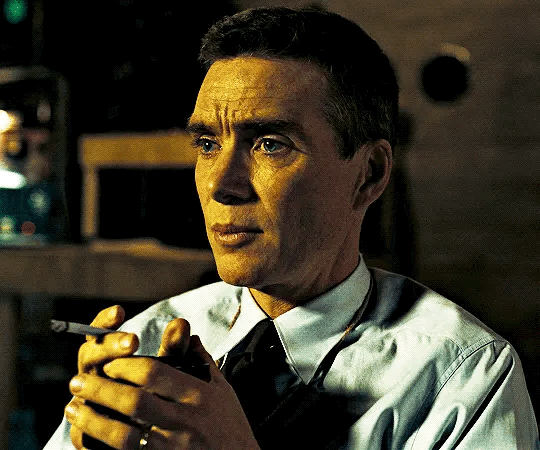
As always, based on a very fictional portrayal by Cillian Murphy.
Warnings: alcohol consumption, Oppie smoking as usual, a spot of academic stress.
Usually the first person that you would turn to when you had a problem was Robert. He was always ready and happy to help, in fact he almost seemed to like the fact that you needed him sometimes, but this was something that you felt like you had to hide. You were struggling to get your work up to the level that you wanted it to be at and if you were honest you were embarrassed to tell him. You were seriously considering dropping the course, having said as much to your professor who supported you as you were studying French with him and the body of your degree was politics and philosophy. Your professor was Robert’s best friend though, and you didn’t know how he would react if you told him you were pulling out. Robert seemed to be a genius about anything that anybody ever brought up, he had never had your problems and you didn’t want him to think any less of you because of it. You had spoken to some friends who were having similar problems, but exams were approaching and despite the improvements that a lot of them were seeing in their grades, you had not been so lucky.
~
It wasn’t unusual for a Chevalier to ask Robert to meet with him, the pair were best friends after all, it was just usually at a local bar rather than in the formal setting of his office. They had arranged to meet during a gap between their lectures, though Oppie was confused by how illusive his colleague had been when he had asked for a reason. When he got there, knocking on the door gently before letting himself in, Chevalier was sat at his desk with a glass of whiskey, signalling for him to come and join him.
“Hoke, nothing’s wrong is it? If something has happened why do you want to talk about it here, I’d be happy to have you over this evening. Y/n’s staying over tonight, bring Barbara, I’m sure she’d enjoy a bit of female company.” He seemed to be fumbling with his words, which was uncharacteristic, unless he was anxious.
The French professor poured a glass of whiskey for his friend before beginning his explanation, a perplexed yet awkward expression on his face.
“Oppie, I don’t want you to think that I’m criticising y/n, because I’m not, I actually think that you are largely to blame for this one, but she’s struggling in my class. We’ve even had extra time working together outside lectures and she’s a natural linguist, but probably the most inexperienced to ever take a French Literature course at Berkeley.” Robert didn’t really know why he was being spoken to about this, surely this was your own personal problem.
“And why is that my fault?”
“Because you were the one who talked her into taking it, she turned up on the first day telling me that she hadn’t finished the intermediate course at school because her teacher was as good as shit and the school fired him and couldn’t get a replacement in time to do the exams. Did she tell you that?” This was all news to Robert.
“No, but we did have a very illuminating discussion about the Proust that I read in Corsica, so I just presumed that naturally…”
“Robert, she loves you and puts up with all of your quirks and eccentricities, I dare say she was nodding along like I do when you talk about physics. Take it from me, sometimes you can have an entire conversation with yourself in a room full of people and not realise that nobody else has joined in.” He was aware that this was one of his faults, but wasn’t keen on his friend lecturing him on it, swiftly trying to move the conversation on.
“Regardless of what caused the problem, what do you propose to do about it?” He pulled a pack of Chesterfields and a lighter from his jacket at this point, anything that made him think always required a cigarette.
“She came to me last week saying that she wanted to drop the course but couldn’t because she didn’t want you to think that she was stupid, so I’m going to suggest that she pauses the course and you, as you’re fluent, help her get to a standard where she can resume it next year if she can stand the language after being taught by you. God, the holidays are nearly here, take her to France for Christmas, make it seem exciting so she doesn’t think she’s letting you down. She’s a natural as I said, just inexperienced and lacking confidence, so immersion would probably be the best teacher anyway.”
After a bit more conversation on the subject, it was agreed that this would be the best plan, Haakon sending his friend home to try and persuade you around to the idea. Robert walked out of the office with a warning to remember that he had to be convincing about the whole thing being his idea.
~
It had become a bit of a Friday night tradition that Robert would take you out on a date, picking you up from the little room that you rented in a house nearby. It was always lovely hearing the beep of the horn from outside your window, taking one last look at yourself and fixing your lipstick before going down to meet him. He had this sort of old world charm to him, always opening your door for you, helping you in and out of his car, and tonight was no exception. The drive to the restaurant was pleasant, he mentioned a new book that he was reading and you talked about how disastrously your orchestral rehearsal was the other day, trying to plough through Tchaikovsky’s fourth symphony for the first time.
“Well, that’s what you get when you go near Tchaikovsky, it’s bloody awful don’t you think?”
“I don’t hate it as much as you do, but I certainly prefer a bit of Beethoven, the symphonies are nice to study to if you’re ever looking for some background noise.”
“I’ll bear that in mind.”
“I can’t stand the fifth anymore though which is a shame, it’s just overplayed.”
“I agree, at least it isn’t Pachelbel’s Canon, I know how much you string players hate that!” He took his eyes off the road briefly to watch you as you laughed at his last comment. You were always beautiful, just more so when you smiled in such a carefree way.
Robert helped you into your seat when you finally arrived, you were quickly brought menus and ordered, opting for the wine pairing that Oppie had guided you to as usual. He may sometimes drink a little more alcohol than was healthy, but at least he had good taste in the stuff. He was halfway through a steak, telling a story about some ridiculous thing that Chevalier had done at a party when he suddenly came out with the question that you really didn’t want to hear:
“Speaking of Hoke, how are you finding French Literature?” You spent a moment debating on whether to make up a lie, say everything was going swimmingly, but he would find out eventually anyway.
“Actually, it’s not going so well. I love languages, I just don’t really have the kind of grounding that I think I need for this. I’d have said earlier, but I didn’t want you to think badly about me for having second thoughts, especially with Haakon being your friend. He’s not the problem by the way, it’s definitely me.” You waited anxiously for his response as Robert considered his next move, knowing he had a plan to stick to.
“When you say second thoughts, do you mean stopping the course?”
“Well, I was considering stopping for now, teaching myself a little more French and resuming it again next year. Though, I’m not sure they’d have me back after this one.” Brilliant, he thought, you were walking right into his little trap.
“I’m sure that wouldn’t be a problem, your delightful and very persuasive inamorato is friends with the professor after all, which could be used to your advantage.” He saw you cringing as his mention of special treatment, which you were always desperate to avoid, and quickly moved on to save himself. “How about you do what you were thinking of, we’ll speak to Hoke together next week and make sure that you’ll have a place next year. In the meantime I can help if you’d like, I’m fluent, not as good as Chevalier but passable.”
“Would you? That would be really helpful.”
“Of course. I love you, why would I not want to help. It’s not like you’re stupid, just inexperienced. Hoke says your a natural, just need a bit more practice.” You were flushing a bit at his praise, you always did when he suggested that he viewed you as a fellow intellectual. His attitudes towards those in his circle that he didn’t weren’t always pleasant, so it meant a lot coming from him.
“There was one other thing. I was wondering if you might want to come and spend the Christmas holidays in France with me, immerse yourself in a bit of the culture. It’s the best way to get fluent that I’ve found.”
“You want to go abroad together, for winter break?”
“If you’re comfortable with it, yes.”
“I’d love to.” He reached for your hand across the table, taking it in his to press a gentle kiss to the back of it.
One conversation with Oppie and, just like that, all of your worries were gone.
#oppenheimer#1950s#american prometheus#cillian murphy#cillian murphy x reader#oppenheimer x reader#peaky blinders#tommy shelby#christopher nolan#j robert oppenheimer x reader#j robert oppenheimer#french#fanfic#request
118 notes
·
View notes
